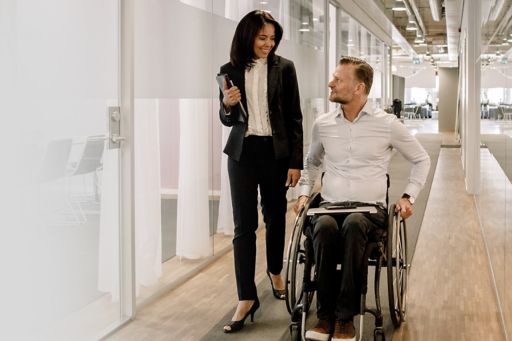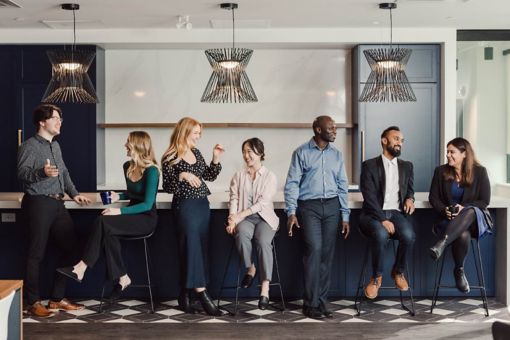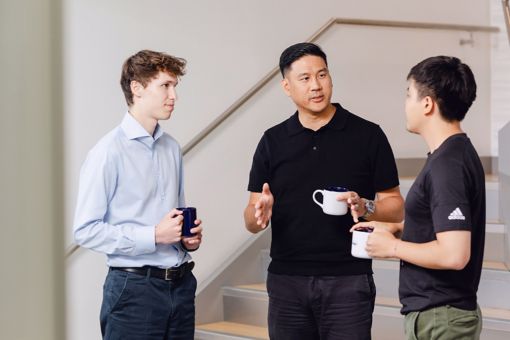We strive to provide a best-in-class application process that is accessible to all our candidates. With your candidate experience and personal journey at the forefront of our concerns, we have integrated inclusion, technology, and integrity throughout the process. Additionally, we have embraced the digital age through our new hybrid interview approach.
We value the diversity of our candidates and vast experience that comes with them. We’ll be with you through each step of the way, and we are looking forward to seeing you thrive!
The journey | Resume tips | Interview tips | Frequently asked questions
The journey

Step 1: Information and networking sessions
Attend your local office’s information and networking sessions.
- Learn about the firm and discover where a career at KPMG can take you
- Meet our recruiters and discover Life at KPMG
Step 2: Application submission
- If you have a question about accessible employment at KPMG, or to begin a confidential conversation about your individual accessibility or accommodation needs through the recruitment process, we encourage you to visit our accessibility page.
- You will need to upload your resume, cover letter and unofficial transcript
- Make sure you are applying to your preferred office location
- You can only apply to one position each recruitment cycle.
Step 3: Interview
Our interview and onboarding process have remained relatively the same. Depending on your office, it will happen either virtually or in-person.
If your interview is conducted virtually, you will receive details on how to access the virtual interview platform and download it before your interview, along with more information on some available features through the platform.
- Ensure you’re in a quiet space
- Check that your audio and video capabilities are working
- Relax and be yourself!
For in-person interviews and onboarding, your recruiter will contact you with details and instructions.
Step 4: Offer
Congratulations! If you were successful during the interview process, our recruitment team will call you with the news and then send your official offer letter. Welcome to KPMG!
Resume tips

The primary purpose of a resume is to create interest about yourself so that you are selected for an interview - it is a marketing document of your candidacy! Campus recruiters receive hundreds of resumes so it’s very important to create a simple and clear snapshot of your experiences and what you have to offer.
There is no standard format for a resume, but make sure you include the following key areas:
Heading
- Include your name, address, phone number, and e-mail address.
Education
- Include school(s) attended, major(s), minor(s), GPA, and graduation date.
- Relevant coursework and academic awards are helpful, but not critical.
Experience
- Include work experience and activities where you developed skills that are applicable to the opportunity.
- Include the position held, name and location of organization, and dates of employment.
- Help us paint a picture of your achievements; use action verbs to describe your responsibilities with emphasis on specific skills and tasks, and be sure to quantify your experiences and accomplishments (e.g., lead a team of four; increased sales by 5%).
Activities, leadership roles, and interests
- Share self-led projects, volunteer positions, extracurricular activities, and professional organizations; don’t just list them, but share what you accomplished within those roles.
- Recruiters are typically looking for transferable skills such as: leadership, teamwork, communication, organization and client-facing skills.
General resume tips
- Be concise. Try to keep your resume to one page.
- Tailor the content of your resume to the role that you are applying to.
- Keep it neat, attractive, organized and easy to read.
- Ensure formatting is consistent.
- Deliver on the firm’s expectations. Read the job description thoroughly and submit your application before the deadline.
- Be professional and appropriate in your language.
Interview tips
You may think that an interview is just a chance for the firm to assess if your skills and experiences match their hiring needs. However, it is also an opportunity for YOU to determine if the firm and position is the right opportunity for you.

Preparation
Research the firm to learn more about the interviewers (if information is provided), culture and career paths available. Preparing questions in advance is important, as it shows your keen interest in the firm. Also, familiarize yourself with the job description.
Perform a self-assessment by reviewing your resume thoroughly, noting your strengths, weaknesses, and key skills, and how they relate to the opportunity. Know the image that you want to portray to the interviewer. There is no need to be nervous as the topic of conversation is YOU!
Practise, practise, practise!
Prepare potential interview questions based on the role and practise your interview responses. Make sure your responses are structured, answer the question directly, and relate your past accomplishments back to the role that you are interviewing for. Because this is a two-way conversation, don’t forget to prepare questions at the end to ask your interviewers!
How to use the STAR Method to answer behavioural interview questions:
- S - Situation: Describe the event or situation that you were in
- T - Task: Explain the task you had to complete
- A - Action: Describe the specific action you took to complete the task
- R - Result: Close with the result of your efforts
Interview attire
Dress confidently and comfortably, but always maintain a professional image. We recommend dressing business casual.
The interview
A good interview allows both the interviewer and the candidate the opportunity to gather information they need to make an informed decision.
Remember to:
- Highlight key accomplishments and experiences
- Listen to the interviewer and the questions being asked
- Don’t use prepared examples if they don’t relate to the question
- If you need to organize your thoughts, pause; silence is better than no structure to your response
- Know your strengths and identify areas of improvement
- Ask questions, including the hiring timeline and next steps
- Thank the interviewer and ask for a business card or email address.
After the interview
Send a personal thank you to your interviewer no later than one day after the interview. Be concise, gracious, and reaffirm your interest in joining the firm.
Virtual interview tips
- Dress professionally
- Keep your background tidy or use a virtual background
- Find a quiet place with minimal disruption
- Use headphones
- Turn off all notifications in apps on phone or computer
- Ensure your technology is working; conduct a test run before the interview day
- Keep resume and interview notes nearby.

Frequently asked questions
Browse the open positions at our firm. Use the search function to explore roles by function, location and/or timing of the career opportunity you are interested in applying for at KPMG. Be sure to read the job description for more details regarding the application process.
You may only apply to one campus role each recruitment cycle.
Within KPMG in Canada, you can only apply for one role each recruitment cycle. If there are roles you are interested in at KPMG offices outside of Canada, you can apply on their career site.
You are welcome to apply again regardless of what stage of the recruitment process you reached during your previous application.
KPMG offers one of the best training programs in Canada. As a firm, we are committed to providing support and mentorship to our employees planning on writing the CFE. Please contact your local office campus recruiter to learn more about the support KPMG in Canada has to offer.
One of the advantages of working at KPMG is that we provide you with choices in where to build your career. You have great flexibility to move throughout the organization as a part of KPMG’s network of 40+ Canadian offices as well as 140+ member firms globally.
KPMG has several programs designed for post-secondary and graduate students who are not yet ready to begin work with KPMG full-time, but who are eager to get a glimpse into the life of one of our employees – these include our summer internship and co-op programs. Speak to your Career Centre to get more information on our events and other opportunities to learn more about a career with KPMG.
Foreign students enrolled in selected publicly-funded, post-secondary institutions in certain provinces and territories are now eligible to work off-campus while completing their studies if they hold a student work permit in conjunction with their study permit. However, students are required to meet specific eligibility criteria.
We recommend that you check with your university career centre to determine if you are eligible to work off-campus during your co-op terms. If you are eligible, please apply directly to KPMG using our online application system. You must present the appropriate work permit before you will be allowed to start work.
At KPMG, we strive for an inclusive recruitment process that allows all candidates to come as you are and thrive with us. We aim to provide a positive experience and are ready to offer adjustments or accommodations to help you perform at your best. Adjustments (an informal request), i.e. extra preparation time or the option for micro breaks during interviews and accommodations (a formal request), i.e. accessible communication supports or technology aids are tailored to individual needs and role requirements.
To request an adjustment or accommodation at any point throughout the recruitment process, please contact KPMG’s Employee Relations Service team for support by emailing cdnersteam@kpmg.ca or by calling 1-888-466-4778, Option 3.
For information about accessible employment at KPMG, please visit our accessibility page.
Insights and resources
Connect with us
Stay up to date with what matters to you
Gain access to personalized content based on your interests by signing up today
Connect with us
- Find office locations kpmg.findOfficeLocations
- kpmg.emailUs
- Social media @ KPMG kpmg.socialMedia









